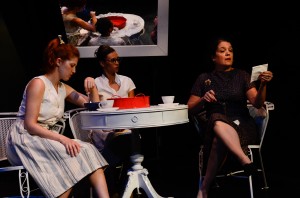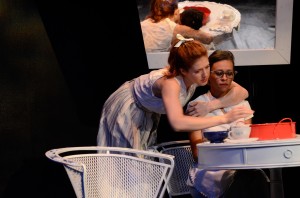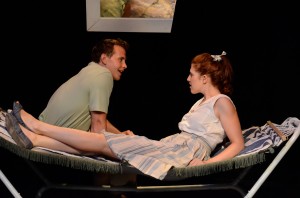THE ARTISTIC HOME PROVIDES GOOD DRAMA,
BUT CAN’T FIX A TROUBLED PLAY
Apparently in The American Plan, the name of the game is deception, but no one seems to think they’re playing. In Richard Greenberg’s drama (which, as the title suggests, unsubtly comments on the falseness of the American Dream), all of the characters are so earnest in their pursuit of an ideal life that they’re willing to deceive even those closest to them to achieve it. Though Greenberg and director Robin Witt certainly deliver on the drama, The American Plan egregiously lacks in two areas: fresh perspective and believability.
The play takes place in the 1960s at the Catskills outside widowed Eva Adler’s vacation home, which sits across the water from a tacky American resort. The highly temperamental, unconventional Lili Adler, who feels as though her mother Eva holds her captive, meets Nick Lockeridge, a young man who is engaged to be married into a wealthy family; Nick plans on becoming an architect and wants to “build a whole city.” His plans change when he and Lili fall for one another, and he finds himself trapped in a web of characters who deceive each other’”as well as themselves.
Kathy Scambiaterra gives a no-holds-barred performance as the wily and calculating Eva Adler. As the “darkly brilliant,” beautiful, and uncannily awkward Lili, trapped by her mother’s rule as well as her own delusions, Margaret Katch delivers. While Katch may downplay the endearing vulnerability of the role, she emphasizes the character’s social naiveté. Lili is brash, blunt, awkward, and yet genuinely insightful with her cutting observations. It’s not so hard to see why Nick might fall for her, given her stunning contrast to the timid, inhibited company to which he’s accustomed. The handsome Nick Horst is remarkably charming as Nick , who shows up to rescue Lili and truly does look “as if nothing ever happened to him.” Horst seems to have a deep understanding of Greenberg’s style for this play’”at first glance, his character seems fairly simple, but as the play goes on, Horst’s portrayal grows in depth and dimension.
But the problem begins there. If the play weren’t set in the 1960’s, the naïve optimism of Nick Lockeridge would be obnoxious and wholly inconceivable. Furthermore, Horst is so convincing in the beginning of the play that his change of heart (when a certain stranger shows up to the Adler’s home) feels forced. Suddenly, the play feels remarkably anachronistic’”the angst of the 90’s, in which the play was written, is jammed into what originally felt like a 60’s period piece.
Not only does the play lack period authenticity, its themes are somewhat regressive. A mother and daughter rely on male counterparts with a dark secret to secure a future for themselves. There isn’t anything in this play that Tennessee Williams didn’t do better in either Streetcar or Menagerie. How many more times do we need to smell this old chestnut wherein The American Dream falls apart?
Greenberg reverts, at times, to basic stereotypes. Eva Adler’s black maid, Olivia Shaw (Tonya Simmons), whose backstory is never told (even though this is acknowledged) and who doesn’t push any boundaries for this archetypal role, is unfortunately inconsequential. The character Gil Harbison, a seeming stranger who visits the Adlers’”and also turns out to have a hidden history’”is ambitious and knows what he wants, but equally ends up being little more than a stereotype used as a plot device. This role has some potential, but Tim Musachio feels awkward and uncomfortable in the role, making his character wholly unsympathetic.
While the writing has its problems, the chemistry between Nick, Eva, and Lili is a sight to behold. The Artistic Home’s The American Plan doesn’t quite move us as much as it’s meant to, but the drama still packs quite a punch. The play simply tries too hard to drive its themes home; the heartbreak here is not for the American Dream, but more narrowly for the disappointment and struggle that await Nick and Lili, who hoped for so much more.
photos by Brian McConkey
The American Plan
The Artistic Home at Stage 773
ends on August 26, 2012
for tickets, call 773-327-5252 or visit Stage 773
for more shows, visit Theatre in Chicago





